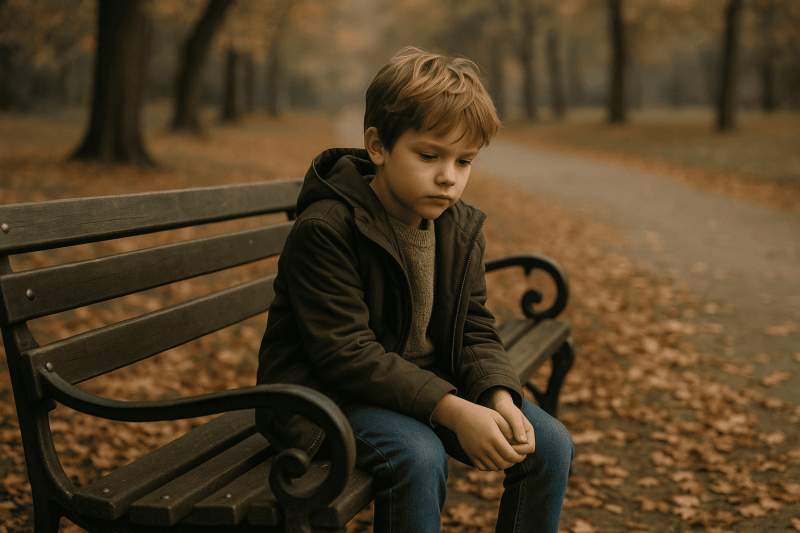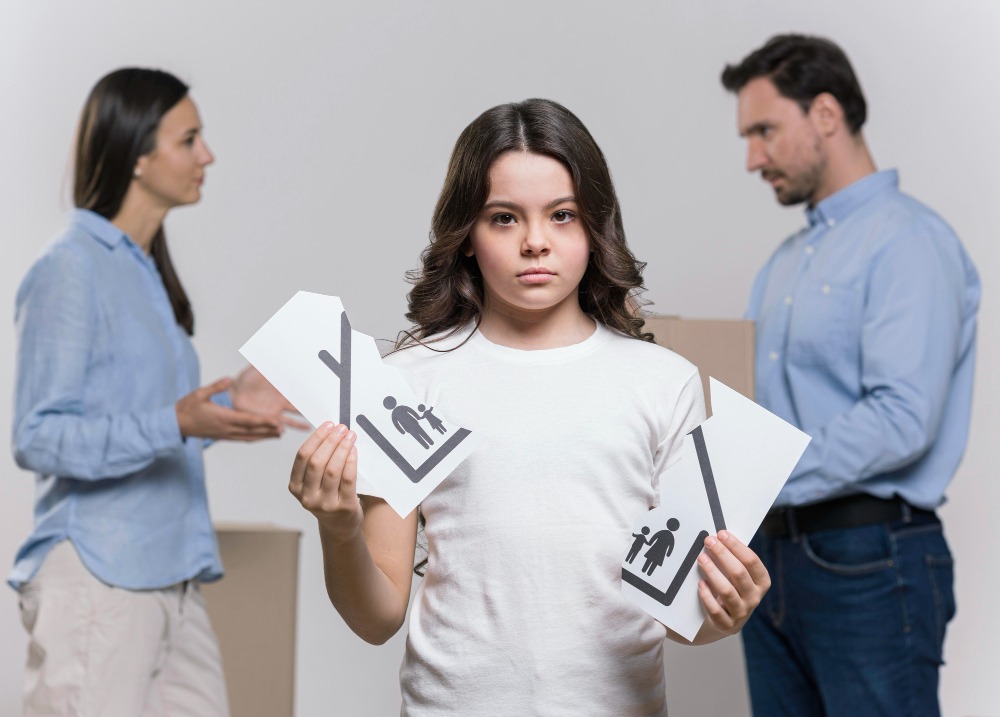Divorce is a major life change for a family, and children often ride an emotional rollercoaster when their parents split up. Many kids feel sad, angry, or anxious upon learning about a divorce.
Some—especially if there was a lot of conflict at home—might even feel relieved or hopeful things will be calmer, though they’ll still worry about how their lives will change.
Every child is unique, but age plays a big role in how they understand and cope with divorce. Toddlers, school-age kids, and teenagers all process the situation differently. Understanding these age-related reactions is crucial for parents.
Recognizing how different age groups experience divorce can help parents provide the right support and foster resilience in their kids.
Toddlers and Preschoolers (Birth to 5 Years)
Very young children don’t fully grasp what divorce means, but they sense the disruption in their world. Infants and toddlers focus on attachment and depend on consistent caregivers, so changes like a parent moving out can make them anxious and clingy.
Common signs of distress in this age include increased clinginess, crying, disrupted sleep, changes in appetite, or even setbacks in developmental milestones (for example, a potty-trained toddler might start having accidents again).
Because children under 3 can’t understand divorce abstractly, they react to the separation itself – they may become afraid that if one parent has left, the other might disappear too.
Preschoolers (around 3–5 years) live in a world of “magical thinking.” They might blame themselves for the divorce, imagining that something they did or did not do caused Mommy and Daddy to split.
For instance, a 4-year-old might think “If I hadn’t been naughty, maybe Daddy would have stayed.” This self-blame leads to guilt and confusion. Preschool-aged kids also struggle to tell fantasy from reality, so it’s common for them to fantasize that their parents will get back together.
Emotionally, they can become fearful, confused, or have angry outbursts and tantrums (some regress to more baby-like behaviors when stressed).
Nightmares or separation anxiety at bedtime can occur as they work through their fears.
Real-world example: Emily is 5. Ever since her parents sat her down to say they were divorcing, she’s been extra clingy at preschool drop-off and has had a few potty accidents after months of staying dry.
One night she tearfully confessed, “I thought it was because I was bad.” She often tells her stuffed animals stories about a mommy and daddy who make up and live together again.
How to help young children: The key for this age is stability and reassurance. Keep their daily routines (meals, bedtimes, etc.) as consistent as possible to give a sense of security.
Remind toddlers and preschoolers often that both parents love them and that the divorce is not their fault. Encourage them to express feelings through play or simple words. For example, drawing pictures or using toys to act out feelings can help a young child who can’t verbalize complex emotions.
It’s also important for parents to stay calm and patient around little ones. Even babies and toddlers can sense adults’ stress. Try to avoid heated arguments or crying in front of them, as this may upset or frighten the child. Provide extra cuddles, hugs, and comfort items (like a favorite teddy bear) to help them feel safe.
School-Age Children (6 to 12 Years)
Children in early grade school (around 6–8 years old) can understand more about what divorce means, but that doesn’t make it easier emotionally. Kids this age often experience a profound sense of loss and sadness – they’re old enough to remember the family being together and may deeply mourn that change.
Many hold out hope that their parents will reconcile and get back together. They might also feel a loyalty conflict, worrying that liking one parent makes them disloyal to the other. It’s common for 6- to 8-year-olds to wishfully blame external reasons (or even one parent) for the divorce, yet secretly some still wonder if they are to blame in some way.
Emotions in this stage can swing from deep sadness (grieving the “intact” family) to anger and anger toward one or both parents.
By upper elementary ages (9–12 years old), children tend to understand that divorce happens because of parents’ issues, but they may still feel angry and betrayed by the situation. Preteens often have a strong sense of fairness and might openly blame one parent who they perceive as responsible for breaking up the family.
It’s not unusual for a child in this age group to call one parent the “bad guy” and idealize the other as the “victim.” They may also worry privately, “Will this happen to me? Is my family normal anymore?” These kids can experience academic problems or trouble focusing in school, and their social life might suffer as well. Some become anxious or withdrawn, while others might act out by fighting with friends or siblings as an outlet for their frustration. Their self-esteem can dip, and they might feel embarrassed that their family is changing.
Real-world example: Ten-year-old Jake has been getting into fights at recess and his grades have slipped. He tells his mom he’s “fine,” but he’s angry at his dad for moving out and sometimes accuses his parents of “being selfish.” Deep down, Jake also worries that if he’d behaved better, maybe the divorce wouldn’t have happened. He misses how things used to be and often daydreams his parents will get back together.
How to help school-age kids: Open communication and stability are critical for this age. Encourage children to talk about their feelings or fears – let them know it’s okay to feel sad or angry about the divorce. Parents should reassure these kids clearly that the divorce is not their fault, nor is it their job to fix things.
Be prepared to answer their “why” questions with simple, honest explanations (without oversharing adult details). It helps to maintain routines (keeping them in the same school, sticking to regular schedules for meals, homework, extracurriculars) to give a sense of normalcy. Each parent should spend one-on-one time with the child, reinforcing that “I’m here for you and that isn’t going to change.”
Consistency and reliability from both homes can ease a child’s anxiety about all the changes. Also, try to avoid conflict in front of the children – hearing parents argue over custody or bad-mouth each other can heighten a child’s stress and feelings of being torn.
Research shows children cope better when parents minimize conflict and cooperate as a team on parenting matters. If a child shows serious signs of distress (like persistent depression, aggression, or withdrawal), consider seeking help from a counselor or support group for children of divorce. Sometimes just talking to a neutral third party (like a school counselor or therapist) helps kids process their complex feelings.
Teenagers (13 and Up)
Adolescents have more cognitive maturity to understand why divorce happens, but that doesn’t mean it’s easy on them emotionally. In some ways, teens’ quest for independence and identity can make divorce challenges unique.
Many teenagers feel anger or resentment – they might judge their parents’ decisions or feel that their trust was broken by the split. Some teens become openly rebellious or indifferent as a coping mechanism, acting like they don’t care about the family changes when in reality they are hurt or worried. Others might feel a sense of relief if conflict at home had been intense, but even then they can experience sadness or guilt for feeling that way.
A common emotional struggle for teens is feeling abandoned or betrayed by one or both parents. They are old enough to recall details and might replay events leading up to the divorce, trying to make sense of it.
Many wonder about their own future: “If my parents’ marriage failed, will my relationships also fall apart?” It’s not unusual for teens to worry that they might somehow “end up like my parents” and to question whether lasting love or marriage is possible. This can manifest as cynicism about relationships or fear of commitment in the long term.
Teenagers may also take on new roles in response to divorce. Some feel they have to act like an adult – for instance, an oldest teen might try to parent younger siblings or even emotionally support a struggling parent. This “parentification” can add stress, as it reverses the usual parent-child support dynamic.
Other teens cope by spending more time with peers or outside activities, withdrawing from the family at a time when the family structure is shifting. While adolescents are generally less dependent on daily family routines than younger kids, they still crave stability and honesty from their parents.
Emotionally, teen reactions can range widely. Many experience a drop in self-esteem during the divorce period, feeling insecure or somehow “different” from their friends with intact families.
Depression or anxiety can emerge in some teens as they navigate the upheaval. Anger is common – a teenager might be furious at one parent for “causing” the divorce, or at both for not making it work.
In extreme cases, unresolved feelings may contribute to risky behaviors: some studies have found that adolescents of divorce are at slightly higher risk for problems like delinquency or substance use, especially if they feel unsupported. Most teens, however, do not experience such extreme outcomes and find ways to cope over time.
Real-world example: 16-year-old Ariana tells her friends she doesn’t care that her parents are splitting up, but privately she feels very hurt. She’s been arguing more with her mom and has started skipping her extracurricular activities.
When her dad cancels a weekend visit because of a work trip, Ariana shrugs it off, but inside she feels abandoned and wonders if he cares about his “new life” more than her. At the same time, she worries whether love can ever last—she’s hesitant to date her longtime crush because she’s afraid relationships inevitably end in betrayal.
How to help teens: Respect and open dialogue go a long way with adolescents. Teenagers appreciate honest communication—invite them to share their feelings and opinions about the divorce, and really listen.
Acknowledge their feelings: let them know it’s understandable to feel angry, betrayed, or sad. It’s important for parents not to lean on teens too much for emotional support or as messengers between parents.
Even though teens are more capable, they still need parenting and reassurance. Make sure they know both parents remain involved and available to them as mom and dad, just in a different arrangement.
Give teens some autonomy in how they spend time with each parent, if possible, so they feel a sense of control (for example, involving them in creating the visitation schedule can help). Never force a teen to “choose sides” or bad-mouth the other parent in front of them – this can intensify their anxiety and resentment. Encourage healthy outlets for stress: involvement in sports, clubs, arts, or talking with trusted friends can provide relief and normalcy.
Some teens might benefit from counseling or a support group where they can hear from peers who have gone through similar family changes. Emphasize to your teen that their feelings are valid and that things will get better with time. Knowing they can still rely on both parents (even if in different households) is crucial for their sense of stability and future outlook.
Short-Term vs. Long-Term Emotional Impacts
In the short term, divorce is often very painful for children of all ages. Studies show that most kids go through an acute period of distress in the first year or two after a parental separation.
During this adjustment period, it’s common to see increased emotional and behavioral problems: kids might be depressed, anxious, or angry, and younger ones especially can act out or regress to earlier behaviors. Many children feel grief similar to a bereavement – they are mourning the loss of the family life they knew.
This acute phase can last many months; in some cases, researchers noted children were even more distressed a year after the divorce than just a few weeks after, as the reality sank in and long-term changes took place. The good news is that for most children, these intense negative feelings are temporary.
A large review of studies concluded that children’s stress is usually short-term and fades over time. Most kids begin to bounce back once routines settle and family life stabilizes in its new form.
Long-term outcomes for children of divorce vary. There is no single “destiny” for kids whose parents split up – many do very well in life, but some may carry emotional scars. On average, research has found that children from divorced families have a higher risk of certain problems compared to those from intact families: they may have slightly elevated rates of anxiety or depression, more difficulties in school, and, later on, challenges in their own adult relationships.
For example, one long-term study found that even 10 years after a divorce, many now-young-adult children still felt sad or “different” because of their parents’ divorce, and they were more wary about marriage for themselves.
Some studies have noted that as adults, people who experienced parental divorce in childhood report lower psychological well-being on average, and a higher chance of getting divorced themselves, compared to those from non-divorced families.
However, it’s very important to stress that these are just general trends and do not happen to every child of divorce. In fact, recent research with more rigorous methods finds that many differences between children of divorce and children from intact families are relatively small.
Most children of divorce grow up to be well-adjusted adults. As one summary of the evidence put it, by their early 30s, a majority of individuals who went through parental divorce as kids are indistinguishable in mental health and success from those who didn’t.
What stands out in studies is children’s resilience – their ability to adapt and cope over time. In fact, contrary to the dire warnings we often see in media, divorce itself usually does not cause irreversible trauma for most children if they have enough support.
Research consistently shows that divorce has few lasting effects on children’s overall mental health or school performance, and that the most notable trait of children of divorce is their resilience in the face of hardship. In other words, most kids bounce back emotionally in the long run, especially when parents handle the situation with care.
So what makes the difference between a child who struggles long-term versus one who comes through relatively okay? Experts say it largely comes down to how the divorce is managed and the post-divorce environment. The biggest risk factors for lasting emotional harm are ongoing high conflict between parents, instability (chaotic moves, changing schools frequently), economic hardships, or a parent’s own severe emotional struggles that spill over to the child.
On the flip side, key protective factors for long-term well-being include: low conflict (parents able to cooperate civilly), consistent involvement of both parents in the child’s life, financial stability, and access to emotional support (from family, counselors, etc.).
When children feel loved by both parents and have routine and security, they are much more likely to adapt well and grow up without serious emotional issues related to the divorce. Ultimately, divorce is a significant event in a child’s life, but it does not doom them to a bad outcome. With time, patience, and support, most children emerge from the experience as healthy, capable young adults.
Guidance for Parents: Helping Children Cope with Divorce
While divorce is difficult, there are many ways parents can help their children navigate the emotional challenges. Here are some general tips based on expert advice to support kids through this transition:
Break the news together, calmly: If possible, both parents should sit down together to tell the children about the divorce, and do it in a private, quiet setting. Don’t wait until the last minute. Present a unified message and a calm tone, which helps your child feel more secure even as they hear tough news.
Use simple and honest explanations: Explain in age-appropriate terms why the divorce is happening, without going into blame or adult-only details. Young children need very basic explanations (“Mom and Dad have decided to live in different houses so there’s less fighting, but we both love you very much”), whereas older kids and teens might want a bit more detail.
Be truthful but avoid oversharing things like financial issues or personal grudges. Most importantly, make it crystal clear that the divorce is not the child’s fault.
Reassure them of love and stability: Children often fear that divorce means they are losing a parent. Emphasize that both parents will continue to be their parents forever – nothing will change that. Let them know you will still see them and care for them (outline the custody/visitation plan in a reassuring way).
Give plenty of verbal and physical affection. Remind them frequently that your love for them has not changed. This consistent reassurance is especially crucial in the early stages when kids feel insecure.
Maintain routines and consistency: During chaos, kids find comfort in the familiar. Try to keep daily and weekly routines as normal as possible – meals, school, bedtime, weekend activities – so life isn’t completely upended.
If children will be splitting time between two homes, coordinate with your co-parent to keep rules and schedules somewhat consistent. Predictability (knowing, for example, that every weekend they will be at Dad’s house and weekdays at Mom’s, or whatever schedule) helps children feel more in control and less anxious.
Encourage open communication of feelings: Let your child know that all their feelings are okay and normal during a divorce. Encourage them to ask questions and share emotions, whether it’s sadness, anger, or confusion.
When they do express feelings, listen without judgment. You can say things like, “I know this is hard – I feel sad too sometimes. We will get through it.” Validating their emotions helps them feel heard.
Younger kids might express feelings through play or drawings – join them in these activities and gently talk about what stories or pictures they create. Older kids and teens might prefer talking to friends or writing in a journal; support these outlets as well.
Never force kids to take sides: Avoid criticizing the other parent in front of the children or using kids as messengers or spies. Hearing one parent bad-mouth the other really hurts a child, who almost always loves both parents.
Long custody battles or being asked to choose one parent over the other are very harmful to a child’s well-being. Instead, strive to keep your co-parenting civil and child-focused.
When parents minimize their conflicts and cooperate regarding the kids, the children do much better emotionally. Save any arguments or legal talk for private discussions away from the kids.
Watch for signs of distress and get help if needed: Keep a close eye on any changes in your child’s behavior or mood in the months after the divorce. Some common red flags that a child is struggling include: declining grades, lots of anger or aggression, withdrawal from friends or activities, frequent crying or sadness, changes in sleep or eating, or regression (for example, acting much younger than their age).
Some kids may develop physical symptoms like headaches or stomachaches due to stress. If you notice serious or persistent issues, consider reaching out to a professional. A child therapist or counselor can provide a safe space for your child to work through feelings. Even resources like school counselors or support groups for children of divorce can be very helpful. There’s no shame in seeking help – it can make a big difference in helping your child adjust in a healthy way.
Above all, continue to be a loving, reassuring presence in your child’s life. A child dealing with divorce needs to know they are not alone and not to blame. With time, stability, and support, children can and do heal from the initial heartbreak of divorce.
Most will even grow in resilience – overcoming this challenge can make them stronger and more empathic. As a parent, handling the situation with empathy and cooperation is the best way to ensure your child comes through emotionally intact.
Remember, children thrive on love, safety, and consistency. By providing those, you help your child navigate the storm of divorce and emerge with confidence in the unconditional love of their family, even if that family now lives in two homes.




